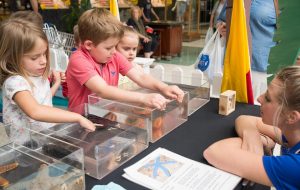There is one time of the year we look forward to more than any other at Ocean Life Education – when collectively as a nation, we take the opportunity to pay homage to the sea.
SeaWeek is Australia’s major public awareness campaign centred around our oceans – a chance to turn our attention on what the water does for us and what we in turn can do for it.
This year’s theme was ‘The Ocean made Earth Habitable’, focusing on how the majority of oxygen in our atmosphere has been produced by microscopic sea creatures during photosynthesis. Thanks to their contribution over thousands of years, life on land was able to develop.
And the impact is still ongoing today – with more than 70 percent of the planet covered in water, it plays a major role in many aspects of our daily lives.
Australia has one of the largest ocean territories in the world – it drives our climate and weather and provides valuable resources. Marine animals and plants are found in medicines that are used to fight cancer, arthritis and heart disease.
On average, we each consume around 25 kilograms of seafood every year, harvesting more than 150, 000 tonnes of fish annually.
Eighty-five percent of Australians live within 50 kilometres of our vast shoreline – drawn to the water not only for food but fun as well. We have 10,000 beaches spread around our 50,000 kilometres of coast and almost 3 million of us own a boat allowing us to explore beyond the shallows.
But as we become more globally aware of climate change and the impact our modern lifestyle is having on the oceans, it’s time for us to breathe new life into the part of our planet that made all of this possible in the first place.
Ocean Life Education is dedicated to promoting the preservation of our marine environment. Our Human Impact Program takes a close look at the effect we have on the world’s waterways and, most importantly, how we can make a change for the better to sustain our seas for generations to come.
To find out more and to become part of the solution, visit https://www.oceanlifeeducation.com.au/programs/



 “Tis the season for excitement and excess… and while our waist lines and bank balances may bear the brunt of our festive good cheer, the oceans suffer too.
“Tis the season for excitement and excess… and while our waist lines and bank balances may bear the brunt of our festive good cheer, the oceans suffer too.